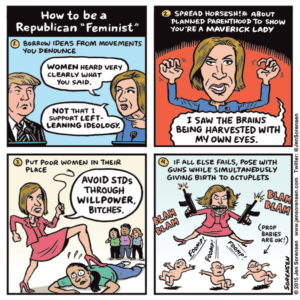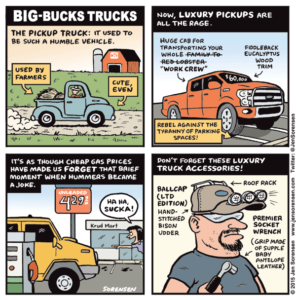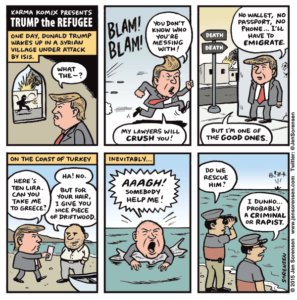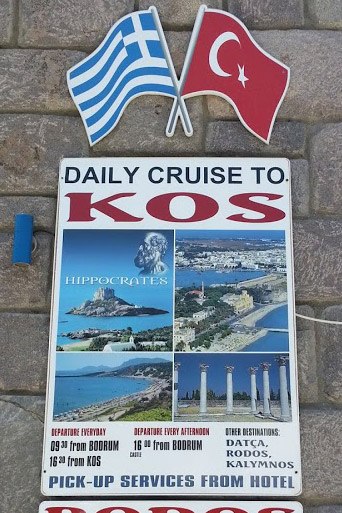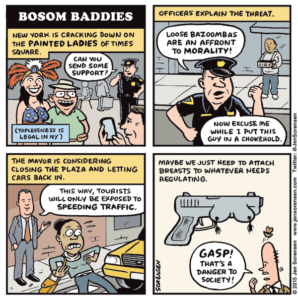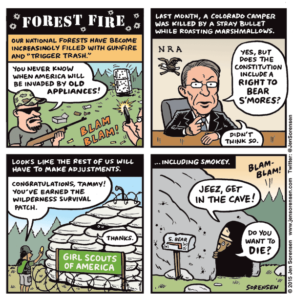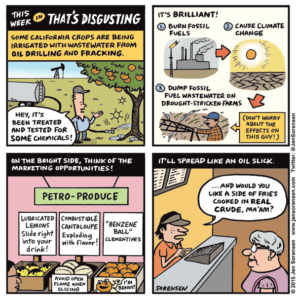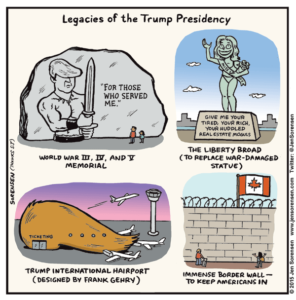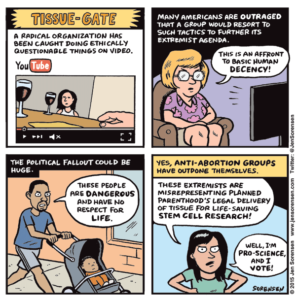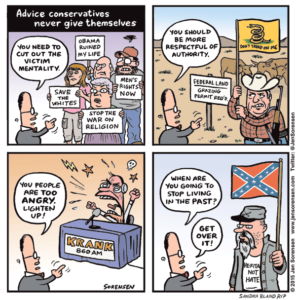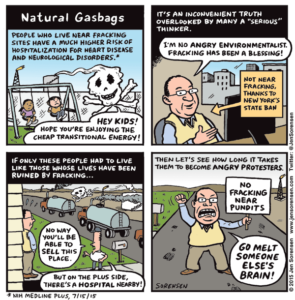The Sorensen Monologues
How to be a Republican “Feminist”
Try making sense of Carly Fiorina’s headache-inducing manifesto “Redefining Feminism” on Medium. A feminist, according to Fiorina, is a woman who lives the life she chooses. Yet she argues that “feminism has devolved into a left-leaning political ideology where women are pitted against men and used as a political weapon to win elections.” It seems she wants to claim the mantle of feminism without actually taking the measures that are necessary for equality. This is a good summary of why the essay is a bunch of self-contradictory nonsense.
Fiorina’s Planned Parenthood remarks have been widely analyzed, but for the record, at no point did anyone say “keep it alive to harvest its brain,” despite her imaginative retelling.
Big-Bucks Trucks
Given the extreme droughts, wildfires, and other assorted weather oddities over the past few years, you might think some sort of inkling about climate change would be permeating the public consciousness, causing at least a few more Americans to pause before purchasing a whale-sized vehicle. And yet here we are, with full-sized luxury pickup truck sales booming and sedan sales sinking, making the SUV heyday of the early aughts look almost quaint. As WaPo’s Wonkblog notes, affluent buyers are snapping up plush $60,000-and-up land barges with heated leather seats and, yes, fiddleback eucalyptus wood trim (I did not make that up). Apparently our brief period of recession-induced humility is over:
“During the recession, if you could afford to buy a fancy new truck, it was not socially acceptable to flaunt it,” said Michelle Krebs, a senior analyst at AutoTrader.com. But “the acceptance of conspicuous consumption is back.”
For those who think these overappointed behemoths have utilitarian value, I will let Mr. Money Mustache set the record straight on their usefulness as work trucks.
Trump the Refugee
I saw many Syrian refugees begging on the streets of Istanbul when I was in Turkey earlier this summer. Little girls would come running up to me asking for lira, sometimes emphatically. I gave on several occasions, but it was impossible to give to everyone. I also visited Bodrum, the resort town where the Syrian boy recently washed up on the beach, making headlines around the world. When I was there, it wasn’t yet obvious that Bodrum was about to become Ground Zero for the refugee crisis. But it’s strange to know I was just walking those beaches and swimming in those waters. You can see the Greek island of Kos from the shore; tourists routinely take day trips there. I snapped this photo because I was reminded of Daily Kos:
I don’t have much to say about Donald Trump’s repugnant comments about immigrants, aside from the suggestion that he use some of his billions to buy a clue about the desperation that drives people into these situations.
Bosom Baddies
If you haven’t heard about the Times Square flap, you can catch up here. And you can read a report by a journalist who went undercover as a desnuda (the term for the painted performers) here.
Personally, I’m scratching my head over why a progressive mayor like de Blasio would even consider destroying a bustling pedestrian space over a few lightly-disguised nipples. As the undercover journalist noted, a half-nude Miley Cyrus already looms over the plaza from a video screen. Traffic-related injuries (the reduction of which has been a cause championed by the mayor) are down since NYC’s plaza program started. European plazas are filled with buskers and street performers, yet those cities manage to cope somehow. By all means, regulate panhandling. But don’t destroy a rare public space designed for human beings instead of cars.
Seriously, there are far more constructive things the NYPD could be doing these days rather than harass women wearing body paint.
Forest Fire: Guns gone wild in national parks
This cartoon was inspired by this disturbing NYT article. I like to think the right to bear s’mores without being shot at falls under the right to life, liberty and the pursuit of happiness.
This week in That’s Disgusting: Oil Wastewater Irrigation
According to this Mother Jones article, the drought in California is leading to increasing amounts of oil wastewater being applied to crops. While I understand and support programs like Bill Gates’ effort to extract potable H20 from sewage water as a means of preventing disease in poor countries, this would not be quite the same. Benzene, a known carcinogen, is showing up in concentrations higher than is allowed for drinking water. As an official comfortingly reassures us in the MoJo article:
“I admit that [some oilfield contaminants] are in there,” says David Ansolabehere, the General Manager of the Cawelo Water District, “but they are at such a low level I wouldn’t think they are doing any harm. But we are looking into that to make sure there isn’t any harm being done.”
The trouble is, testing methods are badly outdated — only recently have officials begun testing for a wider range of industrial chemicals — and fracking chemicals tend to be trade secrets. Energy companies have a long history of claiming their chemical recipes are proprietary information. So how do scientists know what to test for?
I’ll take slightly more expensive clementines than ones laced with unknown industrial effluvia, thanks.
More info on Think Progress.
Tissue-gate
Yes, it’s a big scandal, folks. What with all this fetal tissue research, Planned Parenthood may even have a hand in curing Parkinson’s someday. They must be stopped!
As noted in this editorial, fetal cells have been saving lives for decades:
The use of fetal tissue in research is not new. Fetal cells extracted from the lungs of two aborted fetuses from Europe in the 1960s are still being propagated in cell culture. They’re so successful that today we still use them to produce vaccines for hepatitis A, rubella, chickenpox and shingles. From two terminated pregnancies, countless lives have been spared.
The idea that this smear campaign is a scandal for Planned Parenthood has been assisted by some media outlets taking a clueless, “he-said, she-said” approach to reporting. Politicians such as Rand Paul (who love freedom, except for the reproductive kind) are clamoring for the end of federal funding for PP, yet many news orgs fail to report that no taxpayer dollars actually go to abortions. Many reports (and Republican presidential candidates) also fail to mention the close ties between the video makers and violent extremist groups.
Advice conservatives never give themselves
Some people blame Sandra Bland for escalating the situation during her traffic stop, suggesting she should have been more respectful to the barking officer. Funny how all this finger-wagging about manners when dealing with law enforcement didn’t seem to apply when the person in question was Cliven Bundy, the freeloading rancher who put up armed resistance over paying grazing fees. Apparently rebellion is virtuous if you’re a highly-armed white cowboy/militia leader/Tea Party activist, but if you’re a black woman who forgot to signal while changing lanes, do not even think about behaving ungraciously towards police, no matter how abusive they are.
Other panels in this cartoon were somewhat inspired by a recent David Brooks column, which was written as an open letter to Ta-Nehisi Coates in response his new book. Beneath a veneer of what struck me as patronizing faux-humility, Brooks pretty much slipped into ye olde “why don’t you stop wallowing in victimhood and pursue the American Dream?” line of attack.
Posting schedule
For the time being, I’m going to try to maintain a more regular schedule of posting my comic here on Monday night/Tuesday morning. My travels and editing work for Fusion have made posting a little unpredictable over the last several months, so to simplify things, let’s say Tuesday morning is the new time.
Natural Gasbags
One thing that got under my skin last week was a little remarked-upon NYT column by Joe Nocera making the Very Serious Person’s case for a Sensible and Balanced™ approach to fracking. Environmentalists are dismissed as prone to “hyperbole” and “teeth gnashing,” and fracking is referred to as “a blessing.”
Meanwhile, the National Institute of Health just reported on a study showing how hospitalization rates jump near fracking sites. In particular, heart disease, neurological problems, cancer, urologic problems, and skin conditions were much higher near fracked areas. This isn’t exactly the first time such health concerns have been reported on, but Nocera’s article euphemistically sweeps them under the rug, referring abstractly to the “disruption” and “local controversy” that fracking causes in communities.
Look, we’re way past the point where you can write an essay like this without explicitly acknowledging how gas companies have been bullying communities and destroying people’s health, homes, and finances in a manner that would make the Chinese ruling party proud. We’re not just talking about a few pinpoint locations. We’re talking about huge swaths of the country being made unlivable. But it’s so much easier to call the citizens of Denton, TX and Longmont, CO — who’ve been fighting a David and Goliath battle to keep fracking out of their towns — teeth-gnashing hippies.
Nocera cites Council on Foreign Relations fellow Michael Levi, who claims the dispassionate analysis mantle in coming down in favor of fracking. To his credit, Levi does describe the need for specific regulations — but offers no credible means of accomplishing these legislative goals. You show me companies abiding by the best of all possible rules, show me that communities are no longer having their health destroyed, and then let’s talk about fracking as a viable alternative. Coal is indeed bad, but this is not an excuse to ignore the completely unacceptable health consequences of fracking. I guess these communities are just supposed to wait for that brilliant federal regulation to come along any day now, right?
For a better perspective, I recommend Naomi Klein’s remarks given recently at the Vatican.
Pop Culture Periscope: San Diego Comic-Con Edition
I had a great time at this year’s Comic-Con, and this year had the honor of being a special guest. They even gave me an Inkpot Award, possibly the cutest trophy ever. Of course, it’s hard not to be amused by a certain level of silliness and entertainment-industry promotion at Comic-Con, hence the light satire intended by this cartoon. Like SXSW, it’s a convention that has grown beyond its original scope, with big-budget marketing efforts for TV shows and movies at every turn. But beneath that commercialized surface, there’s still a lot of cool stuff and great people.

